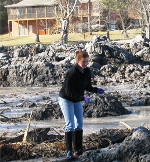
The Naval Research Lab’s Chesapeake Bay Detachment is now host to the latest addition to the state’s oyster restoration and revitalization effort.
The U.S. government has proposed controls on large ships that operate in the waters off the coastlines of Puerto Rico and the U.S. Virgin Islands for the purpose of reducing air pollution.

Warsaw is updating its sewers at a quick pace with the help of 118-inch centrifugally cast fiberglass reinforced polymer mortar pipe.
Evidence that the toxic element arsenic can replace the essential nutrient phosphorus in biomolecules of a naturally occurring bacterium expands the scope of the search for life beyond Earth.
Underwater vehicles will be used by Woods Hole Oceanographic Institute and other university scientists to learn if the Deepwater Horizon oil spill affected animals in the Gulf of Mexico; the public is invited to take a look via the Dive and Discover website.

Current water quality monitoring looks only at the surface, according to Avner Vengosh, Duke professor of geochemistry and water quality.

Many coastal wetlands worldwide — including several on the U.S. Atlantic coast — may be more sensitive than previously thought to sea-level rise projections for the 21st century, according to the U.S. Geological Survey.
North Carolina's LID certification program, which will be discussed in the webcast, may be replicated nationally.
Deforestation rates in the Brazilian Amazon declined 14 percent from August 2009 to July 2010, reaching the lowest rates ever recorded for the second consecutive year.
Coal-tar-based pavement sealant is the largest source of polycyclic aromatic hydrocarbons found in 40 urban lakes the U.S. Geological Survey studied, according to the agency.

Grassroots campaign engages artists and people across the globe to deepen understanding of possible climate change effects.
Earth's largest lakes have warmed during the past 25 years in response to climate change, NASA researchers determined in the first global survey of temperature trends in major lakes.
Possible solutions include installing wetlands to filter tile drainage, fertilizing fields in the spring, and planting winter crops.
Pilot plant will help identify best ways to purify Hudson River water.
Bouchard Transportation Co. Inc. and its affiliates will pay more than $6 million to settle a portion of the federal and state natural resource damages claims for the April 2003 spill of up to 98,000 gallons of oil into Buzzards Bay, according to the Department of Justice.
About one in eight fish samples in Indiana had mercury levels that exceeded the recommended safety limit for human consumption, according to a recently released federal study.
The global firm will seek to grow its business in developing countries while minimizing its environmental footprint.
Duke economist Martin Smith suggests the agency should also consider the potential health and environmental effects of salmon production that might stem from the fish's faster growth and less need for feed.
The government's peer-reviewed reports say the levels of dioxins created during controlled burns were below levels of concern.
EPA's nutrient criteria rule is set to be finalized Sunday; recently elected Florida leaders want more time to analyze the rule's effect on residents.